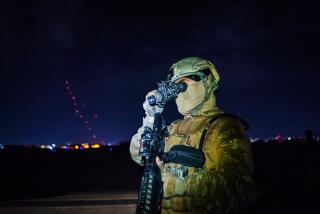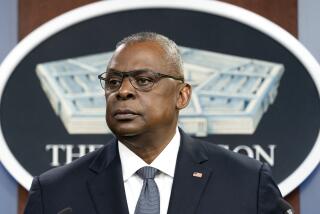Finding a Balance in Peacetime
- Share via
The end of the Cold War has created new realities for America’s military forces. Washington faces difficult--and controversial--choices in the midst of budget constraints and changing national priorities. Now, for instance, a Pentagon draft report suggests that the military assume wider noncombat roles, including humanitarian, drug interdiction and peacekeeping missions, over the next decade.
These are the challenges that come with superpower status, but many in the Pentagon and Congress are not eager to take them on. However, as long as the armed forces are sufficiently manned, trained and equipped to be first and foremost warriors, some noncombat duties make sense.
The issue is being hotly debated within Pentagon walls. If noncombat responsibilities are expanded, some ask, will it be at the expense of existing military programs? How could that be avoided when defense spending is expected to remain flat at $250 billion annually in the immediate future? If downsizing becomes necessary to accommodate humanitarian and peacekeeping duties, what will be cut?
These questions are at the heart of the debate over the Pentagon draft report, which is expected to be completed in mid-May, in time for the quadrennial congressional requirement for the Pentagon to provide a 10-year strategic blueprint for the military.
The draft recommendations reflect a changing world. Recurrent conflicts between ethnic groups and small nations have replaced the superpower rivalries. More emphasis is being placed on preventing these trouble spots from exploding. Currently, American troops are involved in peacekeeping missions in Bosnia, Macedonia, Haiti, Iraq and the Sinai. The U.S. military has been spending about $3 billion a year on noncombat deployments that collectively involve about 20,000 troops.
Opponents of broadening the missions of the American military machine argue that assignment of troops to peacekeeping duties keeps the units from important training in fighting skills. That is a point well taken. The question is how to maximize the use of the uniformed forces without diminishing their primary duties.
We believe the current debate will provide important answers for the decades ahead in terms of priorities and that the Pentagon can find the balance that will permit American leadership to be exercised on a broad scale, including the use of military units in both policing and humanitarian causes.
More to Read
Sign up for Essential California
The most important California stories and recommendations in your inbox every morning.
You may occasionally receive promotional content from the Los Angeles Times.










